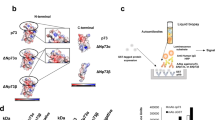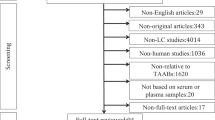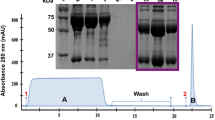Abstract
IN a detailed communication1, I have described two polarographic sero -reactions concerning typical changes in human serum of individuals suffering from cancer, sarcoma, acute inflammations, fever, or some bile and liver disorders.
This is a preview of subscription content, access via your institution
Access options
Subscribe to this journal
Receive 51 print issues and online access
$199.00 per year
only $3.90 per issue
Buy this article
- Purchase on Springer Link
- Instant access to full article PDF
Prices may be subject to local taxes which are calculated during checkout
Similar content being viewed by others
References
BrdiÄka, R., Acta Unio Internationalis contra Cancrum, 3, 13 (1938).
Bergh, F., Henriques, O. M., and Wolffbrandt, C. G., NATURE, 142, 212 (1938).
Rosenthal, H. G., Mikrochemie, 22, 233 (1937).
Waldschmidt-Leitz, E., Angew. Chem., 51, 324 (1938).
BrdiÄka, R., to be published elsewhere.
Author information
Authors and Affiliations
Rights and permissions
About this article
Cite this article
BRDIÄŒKA, R. The Polarographic Sero-Reaction for Cancer. Nature 142, 617–618 (1938). https://doi.org/10.1038/142617b0
Issue Date:
DOI: https://doi.org/10.1038/142617b0
Comments
By submitting a comment you agree to abide by our Terms and Community Guidelines. If you find something abusive or that does not comply with our terms or guidelines please flag it as inappropriate.



